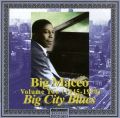`Blues and Rhythm` CD of the month
 Big Maceo: Volume 1 (1941 - 1945) Big Maceo: Volume 2 (1945 - 1950) by Paul Oliver from `Blues and Rhythm` May 2004 #189
Big Maceo: Volume 1 (1941 - 1945) Big Maceo: Volume 2 (1945 - 1950) by Paul Oliver from `Blues and Rhythm` May 2004 #189
Close on half a century ago - well, August 1957 to be precise, I wrote a long (4,200 words) article for Jazz Monthly entitiled `Big Maceo`, which was reprinted in The Art of Jazz edited by Martin Williams. In those days there were no blues periodicals to write for. Big Maceo was one of my obsessions and i tried to obtain all the 78`s that he had made for Victor/Bluebird. When i was close to achieving that goal i decided to write the article. Little was known about him, but as the only place names in his recordings were Chicago, Detroit and Texas, it seemed reasonable to suppose that they were significant. Mike Rowe`s researches (1974) later revealed much of his life story, including his origins in Georgia. But now, Gillian George`s remarkable notes to this two-CD set, based on interviews and correspondence with survivors of Maceo Merriwether`s family, give us a fuller biography. It should definitely be published as an article - Tony Burke, are you listening ?
So, to the music: Maceo is often regarded soley as a `boogie pianist` but as the discs reveal on many of the recordings he was contemplative, anxious, even despairing, as on `Won`t Be A Fool No More.` He was, of course, the composer of `Worried Life Blues`, his first title, made in Chicago in 1941, which was rapidly taken up by Bill Gaither and other. It was also among Maceo`s last titles and seems to have been very personal to him. Several of his blues are slow and medium paced, sung in his burred, somewhat strained voice, but many items like `Can`t You Read`, `Poor Kelly Blues`, `Kid Man Blues` or `Maceo`s 32-20` are singular and memorable.
Though he lacked ambition, Big Maceo was very influential and pianists ranging from Otis Spann to Boogie Woogie Red told me of the inspiration of his playing as a soloist, as accompanist and as a boogie giant. The previously unavailable Columbia test `Flying Boogie` is demonstration enough of his brilliance. Maceo had a musical partnership with Tampa Red and this is superbly expressed in `Texas Stomp`, with it`s instrumental and vocal exchange against an original bass figure. `Detroit Jump` with it`s informal chat is played with a formidable walking bass, but it is `Chicago Breakdown` which demonstrates Maceo`s extraordinary power and inventiveness; in my view it is the masterpiece of the boogie idiom. Tragically, it marked both the peak and the impending decline of his creative life as a blues pianist. Less than a year later he suffered a stroke which paralysed his right side. Other musicians would have given up, but not Big Maceo; he returned to the studio to record with Tampa Red, the young Eddie Boyd playing piano while Maceo sang. At another session Johnny Jones played Maceo-style piano to accompany his vocal, and at a final session in 1950 he was joined by Grace Brim playing wailing Harp and John Brim on guitar., Maceo playing the left hand figures while James Watkins provided the right hand. Understandably, Maceo`s voice sounds prematurely old (he was then 45) on these later titles, but they are not to be dismissed , being still far better than the recordings of many who were to follow. He died of a final stroke in 1953. Half a century later there is still no one in the blues piano history to compare with him. This is an indispensable pair of CD`s to have, but i would like to see a 3rd CD to complete the set, featuring his accompaniments to Big Bill(12), Jazz Gilum (6), Tampa Red (4) and Sonny Boy Williamson (4). 9 Gary Atkinson - are you listening ?). Whether such a CD materialises or not, be sure to get these.
£9.99 Big Maceo Volume 1 1941 - 1945 Flying Boogie DOCD-5673 Click here for further information
£9.99 Big Maceo Volume 2 1945 - 1950 Big City Blues DOCD-5674 Click here for further information




